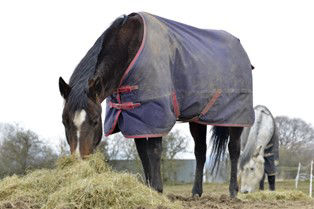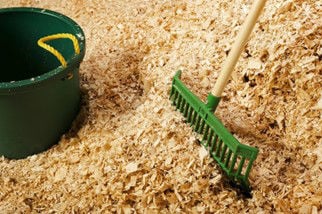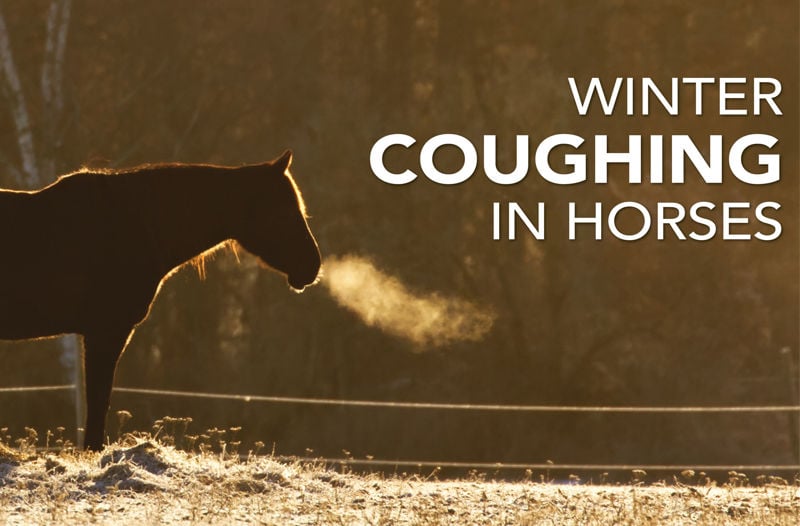Does your horse have a winter cough? Our Registered Nutritionist Steph Hyland (MSc. RNutr.) discusses why your horse may be coughing this winter, and ways to manage it:
Coughing in winter is a common ailment of horses, but just because a lot of horses suffer with this issue it doesn’t mean that it should be ignored. Winter management generally means more time in the stable and a reliance on conserved forages which introduces a higher amount of dust to the horse’s respiratory tract. Stabling and feeding hay doesn’t necessarily mean that your horse will develop a cough, however they are a risk factor for it and horses with a history of respiratory disease, such as those with equine asthma, will be more at risk of coughing when living in this environment.
The occasional cough when routines are changing may be nothing to worry about but persistent coughing and coughing during exercise are likely to indicate an inflammatory response in the respiratory system. Unlike humans, horses do not cough to ‘clear’ their throats, so it is more indicative of respiratory distress if you hear your horse coughing.
Why should I be worried about my horse coughing?
Horses are natural athletes with a staggering ability to take in oxygen and deliver it via the lungs to working muscles. In a healthy horse, the respiratory tract supplies all the body's tissues with enough oxygen and copes with the increased demand for oxygen associated with exercise.
Coughing is a sign of respiratory distress and respiratory issues can cause difficulty in breathing, reduced stamina and performance, lethargy, and reluctance to work among other problems. Inflammation within the airway results in narrowing of the lower airways in the lungs which is caused by constriction of muscles and a build up of mucus which makes it harder for the horse to breathe.
Please note that a developing cough and nasal discharge could be a result of a respiratory infection and close proximity to other horses can increase the risk of infection or disease spreading rapidly from horse to horse. So, if you are at all concerned about your horse’s respiratory health then you should contact your veterinarian for advice.
What are the risk factors for my horse developing a cough this winter and how can I manage these?
Horses evolved to eat with their heads down, which allows mucus to drain from the respiratory tract. Modern management often requires horses to eat with their heads up from haynets or raised feeders. Even if feeding from the ground is encouraged, most horses will be required to be stabled for a period of the day or night, and this reduces the free flow of air around the horse and exposes their respiratory system to dust.

Feeding from the ground is encouraged as it allows mucus to drain from the respiratory tract.
There are some potential factors which can result in the development or exacerbation of an environmental cough in your horse:
· Bedding
- Some bedding is dustier than others and can make coughs worse. Using dust extracted bedding and keeping your horse’s bed clean and dry could help.
- Avoid deep littering as a soggy bed will encourage ammonia build up and potential endotoxins which will also irritate your horse’s airways.
- Avoid mucking out whilst your horse is in the stable.

Using dust extracted bedding and keeping your horse’s bed clean and dry could help.
· Air flow
- A lack of free-flowing fresh air can cause a build-up of dust in the stable. Providing good ventilation will help. Keep your stable well swept and if feeding forage from the floor or a manger then ensure any debris is removed before refilling.
- Ideally turning your horse out as much as you are able and when weather conditions allow, to provide as much fresh air as possible.
· Poor quality forage
- Forage can be full of dust and fungal spores, soaking it can certainly help however this will reduce its nutritional value.
- Depending on your horse, haylage could be a viable alternative.
How can you support your horse who's coughing this winter?
The horse's airways are highly specialised to ensure efficient function and to protect them from environmental irritants. Their defences include a lining of tiny hair-like cilia and a thin layer of mucus which traps particles and stops them from travelling deep into the lungs, and specialised cells called macrophages which engulf tiny particles that have made it right down into the alveoli, deep within the lungs.
Therefore, to support your horse who is coughing, we recommend that you follow correct management practices to keep housing as dust-free and well ventilated as possible. Feeding a respiratory supplement can further support your horse’s respiratory tract and maintain their comfort and performance.
For any advice or questions you may have, please don't hesitate to reach out to our expert nutrition team. You can call 0800 585525 Monday-Friday 8:30am-5:00pm. Email [email protected], or send us a DM on social media.


